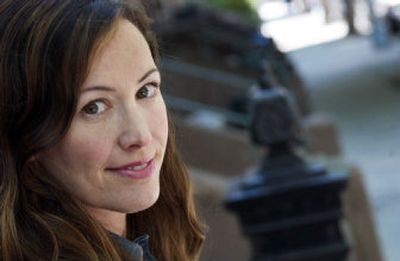Interviewing absurdly famous people isn’t that easy

Getting famous people to like you is not always fun.
But it was a crucial part of the job for Jancee Dunn, a former Rolling Stone reporter and MTV2 vee-jay who has been ingratiating herself to stars for more than 15 years.
She realized early on that if they didn’t like her within the first five minutes of an interview, she was sunk.
“Famous people are like taffy,” Dunn says. “They are only pliant for a short period of time before they harden, and you’re left with canned answers as their eyes flick around the room, seeking a rescuing publicist.”
So she stockpiled an arsenal of trade secrets, which she reveals in her new book, “But Enough About Me … A Jersey Girl’s Unlikely Adventures Among the Absurdly Famous” (HarperCollins, 288 pages, $24.95).
Can’t get a bored lead singer to open up?
“Pay attention only to the drummer,” Dunn advises in her book. “His other band mates will at first be confused, then annoyed. Finally, their competitive spirit will take over and they will enthusiastically jockey for attention, offering amusing anecdotes about groupies and telling off-color jokes. Do not use any quotes from the drummer.”
The strategy worked during an interview with Green Day, who were, in Dunn’s words, “badly behaved” during an MTV interview, although later they called to apologize.
“Their publicist made them do it, which was embarrassing,” she says. “Then I felt like the first-grade teacher who walks out of the room crying.”
After years of telling other people’s stories, Dunn was ready to tell her own.
“I was used to hiding behind the people that I interview,” she says. “The story behind the story is kind of surreal.”
The daughter of a Southern mom and a second-generation J.C. Penney manager dad, Dunn says her first name is derived from the store.
During the status-obsessed 1980s, Penney’s could be a source of shame. When her dad brought home knockoff versions of brand-name clothes, purchased with his employee discount, Dunn refused to wear them.
“Penney’s translation of the Polo shirt … was called Hunt Club,” she recalls in the book. “But instead of Ralph Lauren’s horse and rider, Hunt Club just had the horse.”
From early on, Dunn, “class clown” in her 1984 yearbook, worked hard to amuse the “A-list” at her school.
In “But Enough About Me,” she describes herself as “the peripheral Don Rickles figure to the bronzed and carefree Dean Martins and Frank Sinatras, bristling with sour flop sweat, one bad joke away from being banished from the Sands.”
After dropping out of the University of Delaware, Dunn worked at an ad agency and as a magazine fact checker. That was the breadth of her professional experience when she scored a position at Rolling Stone in 1989.
“I think it was that New Jersey scrappiness,” she says. “I really did feel that I wanted it more desperately than anyone else.”
Dunn was soon landing profiles of everyone from Johnny Rotten to Loretta Lynn. During interviews with Ben Affleck and Mel Gibson, she was snapped by the paparazzi and mistaken for their “gal pal.”
She learned that one quick way to warm up celebs was to recite obscure factoids about them: “Did you know that one of your cigarette butts is up to $12.50 (on eBay)?”
But life as a half-hearted “rock chick,” fawning over the famous and unstable, began to take its toll. By the end of the book, Dunn, a closet Cat Fancy fan who likes to build gingerbread houses, realizes she must embrace her “inner grandma” and stop trying so hard to be cool.
“I’m a cookie-baking geek, about as far away from rock as you can imagine,” she now boasts.
These days, Dunn is happily married to journalist Thomas Vanderbilt (“he’s not one of those Vanderbilts,” she clarifies) and has scaled back on celebrity profiles.
She writes fiction and occasional profiles for staid magazines such as Redbook.
“I decided,” she vows, “that I’m only going to interview people who are sane.”